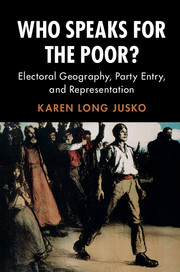Book contents
- Frontmatter
- Dedication
- Epigraph
- Contents
- List of Figures
- List of Tables
- Preface and Acknowledgments
- 1 Who Speaks for the Poor?
- 2 How Electoral Geography Matters
- 3 New Parties and the Changing Electoral Geography of Contemporary Democracies, 1880–2000
- 4 The Populists and “Third-Party Men” in America
- 5 Strategic Entry of the CCF and Social Credit in Canada
- 6 The Implications of Electoral Geography for British Labour
- 7 The Swedish Social Democratic Party, and the Long-Term Implications of Electoral Reform
- 8 “It Didn't Happen Here”: The General Implications of Electoral Geography for the Political Representation of the Poor
- References
- Index
- Miscellaneous Endmatter
1 - Who Speaks for the Poor?
Published online by Cambridge University Press: 05 September 2017
- Frontmatter
- Dedication
- Epigraph
- Contents
- List of Figures
- List of Tables
- Preface and Acknowledgments
- 1 Who Speaks for the Poor?
- 2 How Electoral Geography Matters
- 3 New Parties and the Changing Electoral Geography of Contemporary Democracies, 1880–2000
- 4 The Populists and “Third-Party Men” in America
- 5 Strategic Entry of the CCF and Social Credit in Canada
- 6 The Implications of Electoral Geography for British Labour
- 7 The Swedish Social Democratic Party, and the Long-Term Implications of Electoral Reform
- 8 “It Didn't Happen Here”: The General Implications of Electoral Geography for the Political Representation of the Poor
- References
- Index
- Miscellaneous Endmatter
Summary
Who speaks for the poor? More generally, why do parties and legislators represent the interests of some groups, and not others? In the United States, advocates for low-income citizens are hard to identify: Recent political science research demonstrates, for example, that elected officials often ignore low-income Americans’ preferences and interests (e.g., Gilens 2012, Bartels 2008). Further, the absence of social democratic or workers’ parties – parties that usually represent the interests of low-income citizens – distinguishes the US from all other post-industrial democracies. Why have social democratic or workers’ parties formed and persisted in other countries? Why are legislators in other democratic societies more responsive to the preferences of low-income citizens, compared to their American counterparts?
By focusing on the political and partisan representation of low-income citizens, this book will offer an innovative explanation for a long-standing puzzle of comparative politics – why do parties represent the interests of some groups, while others are never mobilized as a partisan constituency? Specifically, this book will show that parties represent the interests of those groups who are favored by changes in electoral geography. In the case of low-income voters, political entrepreneurs saw electoral opportunities in the changing electoral geographies of the late nineteenth and early twentieth centuries, and responded by forming new parties and mobilizing low-income communities. Whether these “third-party men” developed populist or social democratic platforms reflects the location and interests of newly pivotal voters. That is, when the newly pivotal low-income voters were predominantly agricultural, new parties developed populist platforms; alternatively, social democratic platforms reflected the interests of newly pivotal industrial workers. Policy (i.e., poverty) responsiveness varied with the structure of local needs, and had lasting, cumulative effects on social policy in each country. Importantly, therefore, elections do not simply aggregate preferences (or grievances) around which parties and candidates mobilize. Rather, which preferences – whose interests – are expressed by parties and candidates is a direct consequence of which groups are favored by changing electoral geographies.
This explanation is quite different from existing accounts of cross-national variation in social policy, which typically emphasize tastes (or demand) for redistribution and beliefs about the origins of poverty, the historical role of unions and class-based organizations in Europe, the disenfranchising effects of increasing income inequality in the United States, or electoral rules and their effects on government formation.
- Type
- Chapter
- Information
- Who Speaks for the Poor?Electoral Geography, Party Entry, and Representation, pp. 1 - 15Publisher: Cambridge University PressPrint publication year: 2017



